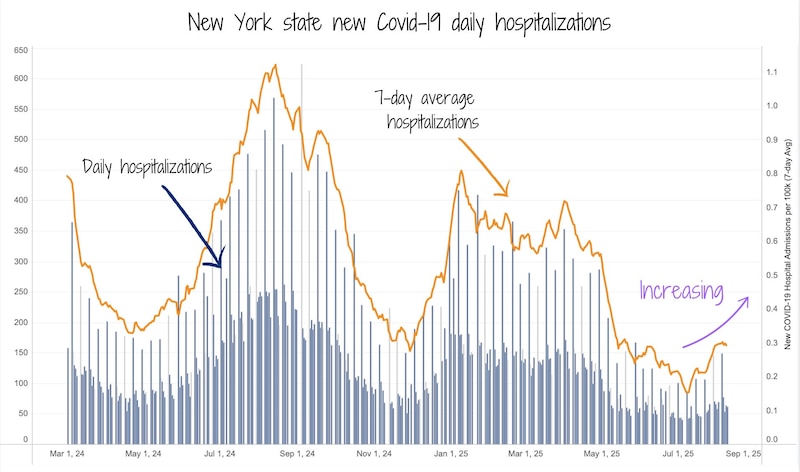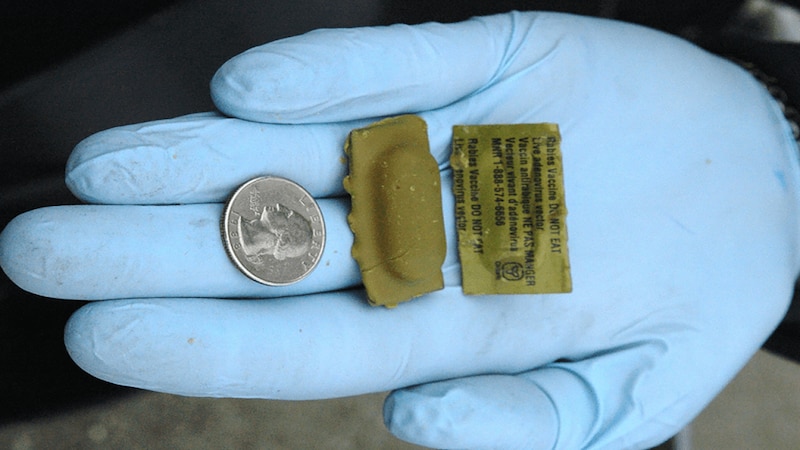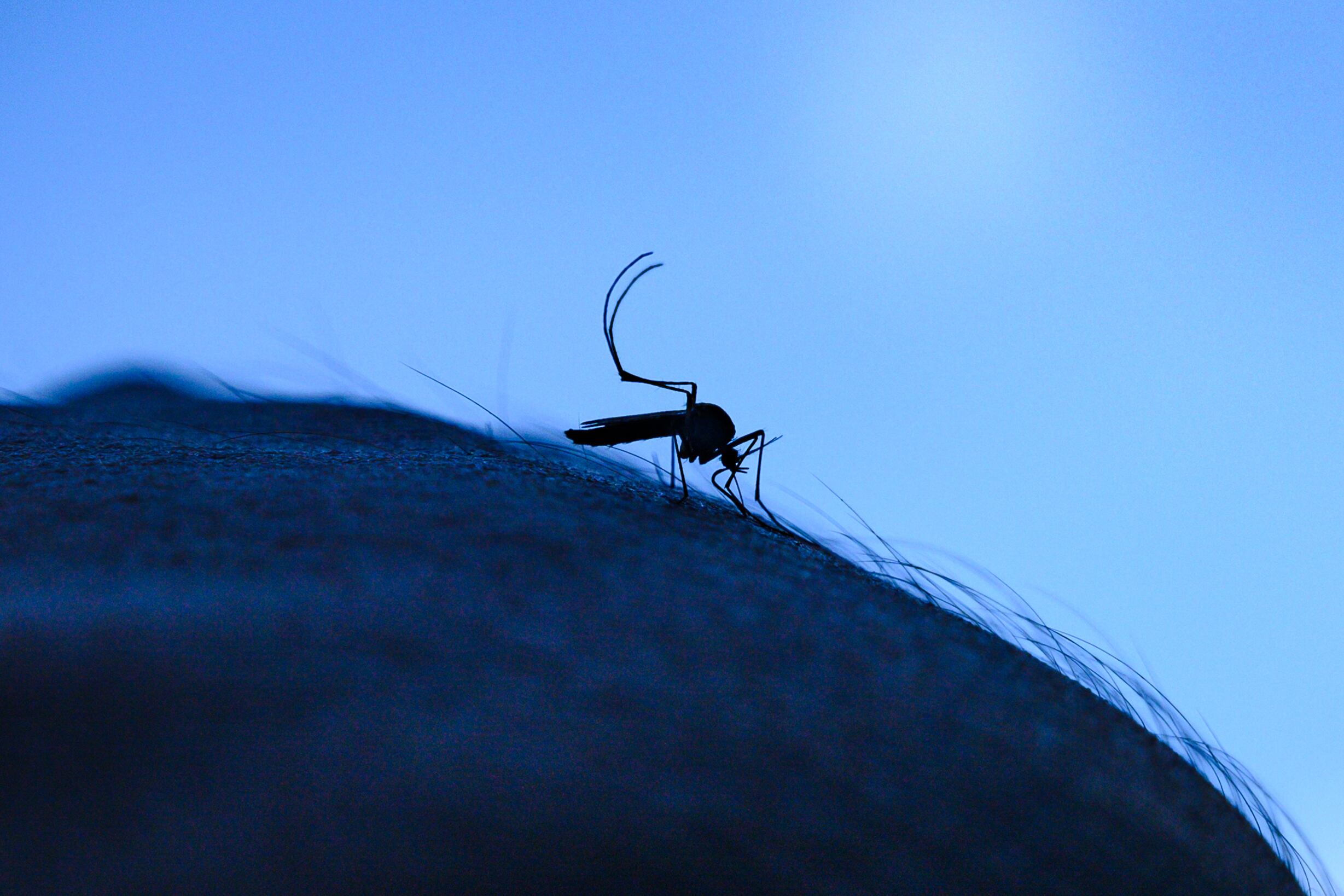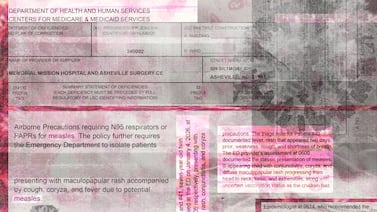This article originally appeared at Your Local Epidemiologist New York. Sign up for the YLE NY newsletter here. Public health, explained: Sign up to receive Healthbeat’s free New York City newsletter here.

This week’s dose is heavier than usual. I’ll cover the typical summer health updates (West Nile virus, Covid, and algal blooms) but am also sharing some reflections on the tragedy at the Centers for Disease Control and Prevention last week: a mass shooting. As a former CDC employee, this one shook me.
But before we jump in, we’re hiring! If you or someone you know is passionate about public health communication, apply here for our Managing Editor position.
West Nile Virus is being detected across New York state
We continue to see West Nile virus pick up across New York, which is typical for this time of year. This week, mosquitoes tested positive in Erie, Nassau, Onondaga, Rockland, Suffolk, and Westchester counties. In New York City, mosquitoes carrying the virus were found in all five boroughs. New York, Richmond, Bronx, Queens, and Kings counties also reported positive mosquitoes. A small number tested positive for Eastern Equine Encephalitis virus, which is rare but more dangerous than West Nile.
New York counties are ramping up mosquito control. Many have conducted or plan to conduct aerial insecticide spraying, where a plane disperses chemicals to kill mosquitoes or prevent breeding. (You can check your local health department website for local schedules.) Recent or upcoming events include Cattaraugus County (Aug 17–23), Onondaga County (last week), and New York City (Brooklyn and Queens this week).
If spraying is scheduled in your community, you can reduce exposure to chemicals by:
- Staying indoors
- Bringing pets inside
- Closing windows
Covid continues to increase, though slowly
Due to delays on the CDC wastewater dashboard, most New York sites aren’t reporting public wastewater data, so I’m focusing on clinical data to understand trends in Covid activity.
All regions of New York, except for Mohawk Valley and North Country, show that Covid hospitalizations are increasing. Hospitalizations are still substantially lower than they were this time last year.

If you are feeling sick and take an at-home rapid test, make sure to check the expiration date. Many tests had their expiration dates extended, but they are now approaching those dates. This guide by the North Carolina Department of Health has good instructions on how to check.
Reflections on the tragic CDC shooting
It was the last day of the summer course. The culmination of a month of daily, intensive training for this year’s class of Epidemic Intelligence Service Officers, a program I went through myself. EIS officers are CDC disease detectives, trained to investigate and respond to outbreaks and other urgent public health threats in the United States and around the world. Instead of celebrating, they spent hours sheltering in place on the CDC’s campus as a single shooter sent over 180 rounds of bullets into the windows of four buildings. Many are now afraid to even display their CDC parking decals on their cars for fear of being targeted in public.
There have been more than 260 mass shootings this year in the United States, nine of them in New York, and the effects of each one ripple across individual lives and entire communities. This week, I’m worrying about the long reach of this attack on my friends and colleagues at the CDC and on our entire public health system.
I have more questions than answers. Who will pick up the torch in the next pandemic if our frontline people burn out or leave? Where does this leave us in 10 or 20 years, or in the wake of another health emergency? Why is health leadership so silent on this? What does it say about our country if our government employees are afraid to go to work?
For those in public health here in New York, or elsewhere, I see you. You aren’t alone. Feel free to drop a comment or directly reply to this email; let’s process it together. For everyone else, check in on your people in public health. Thank them for their service.
I’m also donating to the fund for the family of the officer who lost his life protecting the CDC from the shooting. You can join me here: https://give.cdcfoundation.org/give/715122#!/donation/checkout.
What else you need to know this week
Algal blooms: Some New York freshwater beaches — like Sylvan Beach, Verona Beach Park, and Oneida Shores — were closed this week due to harmful algal blooms. These blooms, caused by overgrowth of blue-green algae (cyanobacteria), can cause skin rashes, stomach upset, or more serious illness if swallowed or inhaled. Before swimming at lakes or ponds, check local advisories, and pay attention to posted signs. If you or your pet were exposed, rinse off really well and seek medical care if symptoms develop.
Rabies vaccine campaign in Erie County: From Aug. 13 to 23, the U.S. Department of Agriculture will be dropping fish-scented bait packets containing oral rabies vaccine across Erie County by helicopter. When raccoons and other animals eat the bait, they become immunized against rabies. If you find a packet, don’t touch it. If you must handle it, wash your hands immediately. Keep an eye on kids and pets when outdoors during distribution, and keep pets leashed to keep them from eating the bait. See the distribution map here.

Hand, foot, and mouth disease in New York: Some doctors in New York are reporting that this year is an exceptionally bad year for hand, foot, and mouth disease. So if you feel like this is tearing through your kid’s daycare or preschool, you aren’t alone. HFM is a super common and very contagious virus that mainly affects children under 5. It’s usually mild, but symptoms can include fever, mouth sores, and skin rash. There isn’t a ton to be done about it. The best things to do are to keep things clean (wash hands and surfaces) and talk to your child’s health care provider if they develop symptoms.
Bottom line
This week we’re reminded of how vulnerable public health can be, and how much it relies on people who care about it deeply. If you are in public health, know that we are with you and are so so grateful for your work. If you’re not in public health, it’s a good time to check in on those who are.
Love,
Your NY Epi
Dr. Marisa Donnelly, PhD, is an epidemiologist, science communicator, and public health advocate. She specializes in infectious diseases, outbreak response, and emerging health threats. She has led multiple outbreak investigations at the California Department of Public Health and served as an Epidemic Intelligence Service Officer at the Centers for Disease Control and Prevention. Donnelly is also an epidemiologist at Biobot Analytics, where she works at the forefront of wastewater-based disease surveillance.






